#bolt
GM Doesn’t Rule Out Eventual Return for Bolt
It’s a common knock on GM that the company has a tendency to kill its darlings just as they get them right; look no further into history than the Pontiac Fiero and Cadillac Allanté as two good examples*. Some pundits muttered similar oaths about the all-electric Bolt when news surfaced that the model isn’t long for this world – but statements on an NPR podcast last week could give hope to the popular (and affordable) little EV.
Chevrolet Recalling 140,000 Bolt EVs Over Fire Risk
The Chevrolet Bolt is under recall for another defect that reportedly poses a fire risk. However, it’s got nothing to do with the battery this time around. Instead, the automaker has all-new concerns about seat belt pretensioners venting hot exhaust gasses that could ignite interior carpet. In response, General Motors will be recalling 140,000 examples of the Bolt produced for the North American market.
Chevrolet Offers Bolt Owners Money If They Waive the Right to Sue
With the Chevrolet Bolt gradually losing its competitive edge as more all-electric vehicles take the field, and the car on the hook for a high-profile recall relating to battery fires, General Motors opted to reduce its price by six grand this year in a bid to make the 2023 model year more appetizing to consumers. Prior to the Biden administration pushing to renew EV tax credits as part of the "Inflation Reduction Act of 2022" (basically a tweaked version of Build Back Better), GM had little hope of its vehicles benefiting from continued government incentives that it had already exceeded its sales quota for and needed a remedy. However the sudden price cut didn't sit well with customers who had just purchased a Bolt EV (or EUV) at the earlier price point, so the automaker attempted to cut them a semi-Faustian bargain.
GM May Replace Bolt With Less-Expensive Ultium-Based Vehicle
The all-electric Chevy Bolt has had a rough go over the last year, falling victim to battery troubles which led General Motors to halt production and recall every single copy they’ve ever built so they could stuff the things full of new electrons because of a fire risk.
Alert readers will know those recalled battery packs are different than GM’s own Ultium product, tech that’s finding its way into all forward-looking EVs from The General. This makes the Bolt something of an outlier and, after hearing remarks from Mary Barra in this week’s GM earnings call, probably a dead car walking.
Chevrolet Bolt Recall: Orion Assembly Schedules Some Downtime
Michigan’s Orion Assembly will be taking three weeks of downtime this month as General Motors continues addressing the fire recall pertaining to Chevrolet’s all-electric Bolt.
The automaker notified employees that the facility will see production idled from November 15th through December 3rd, though vehicle assembly won’t resume until the 6th. However the plant is already running on a diminished schedule so staff can assist with maximizing LG battery output and offer additional support related to the recall.
Chevy Bolt Fire Fix Allegedly Finalized
The Chevrolet Bolt has evolved from being General Motors’ superstar EV, radiating optimism for the company’s ambitious electrification strategy, to a public relations nightmare in relatively short order. While sales of the hatchback (and EUV) actually skyrocketed in Q2 of 2021, thanks largely to a diminished production output from the same period in 2020, shoppers are becoming aware of the fire reports and prolonged recall campaign that followed.
Another chapter has been added to that story, with GM now convinced that this will be the conclusion of the dejected tale. On Monday, the manufacturer issued an announcement that batteries for the Bolt had resumed production. But they won’t be coming out of the South Korean facility owned by LG Chem that’s been alleged as ground zero for the relevant defects. GM has instead elected to source the units from Michigan while LG improves quality assurance with the automaker peering over its shoulder, hopeful that customers will someday be able to use their car normally. Sadly, that moment still looks to be several months away.
The Chevrolet Bolt is Becoming Embarrassing for GM
If you’ve been following the Chevrolet Bolt, then you know it’s gone from a competitive front-motor, five-door all-electric subcompact to a tinderbox on wheels. Battery issues have resulted in numerous recalls while the associated fire risk is gradually making it the spiritual successor to the Ford Pinto flambé edition. Though, in fairness, the Bolt issue is nowhere near as devastating as those vintage Ford fires and pales in comparison to the General Motors’ own faulty ignition switch fiasco that left over 100 people dead.
It’s still leaving a bad impression, however, and GM’s latest decision (prudent as it might be) won’t be helping. As part of the recall campaign, the manufacturer has advised owners not to park the vehicle inside garages or close to buildings. It also has a charging protocol for customers to use to help minimize its risk of spontaneous combustion. Following yet another fire incident, GM has updated those recommendations and now advises drivers to park the Bolt at least 50 feet away from all other vehicles.
Opinion: Now is the Time to Buy a Used Chevrolet Bolt
You have to feel for the people in charge of marketing the Chevy Bolt. After months of news stories about the company’s first mainstream EV bursting into flames in customers’ garages and various statements blaming everyone from the battery manufacturer to the charging stations to the owners themselves for failing to stick to the NHTSA safety recommendations, General Motors launched a massive recall.
GM Upset With Battery Supplier, Expands Bolt Recall Again
On Friday, General Motors announced that its recall of the Chevrolet Bolt would result in a loss of $1 billion. But only after it expanded the campaign to encompass every electric vehicle it has produced. Rather than a single $800-million defect requiring fire-prone models to come back for repairs, GM is now confronting two problems and including Bolts (and Bolt EUVs) from 2019 onwards. The automaker has said this will necessitate an additional billion-dollar financial setback.
Keen to avoid being the recipient of the swelling public outrage, the manufacturer has been trying to shift criticism onto battery supplier LG Chem. The South Korean firm has been involved in numerous fire-related recalls pertaining to electric vehicles and GM would very much like to remind you of that, rather than take the blame for building and selling EVs that it’s advising customers not to charge too much or park anywhere near their home.
GM Replacing Battery Modules On Recalled Chevy Bolts
The Chevrolet Bolt has become the focus of negative attention following some fire incidents that were believed to be related to battery components. After two recalls, General Motors has decided to replace the battery modules of every model that could be impacted — rather than focusing on units with proven defects.
While it’s undoubtedly going to cost the company a fortune, this is probably the correct move. The implications of negative publicity stemming from repeat vehicle fires have a tendency to linger and be blown up to larger-than-life proportions. This is especially true if an automaker rushed that vehicle to market to better wrangle the segment. Just ask Ford about the Pinto if you’ve any doubts.
Hot Tip: Chevrolet Addresses Bolt EV Fires, Readies Recall
Chevrolet has issued a statement to owners of Bolt EVs that could be subject to surprise fires while charging, offering more tips on how to avoid burning down their homes while it preps another recall. General Motors and supplier LG Chem have identified “two rare manufacturing defects” that they believe are causing the fires and are suggesting avoid charging their vehicles in an extremely specific manner until after the secondary recall has been conducted.
NHTSA Cautions Against Leaving Chevrolet Bolt EVs Indoors
The National Highway Traffic Safety Administration (NHTSA) has issued an alert pertaining to Chevrolet Bolt owners, as the vehicles’ LG Chem battery packs could have a propensity to catch fire. On Wednesday, the safety organization recommended that the cars be left outdoors (ideally a healthy distance from anything flammable) and never left unattended while charging.
This defeats one of the largest perks of owning an electric vehicle (at-home charging), as customers will be required to buy extra-long cables and monitor their car outdoors for hours as it takes on energy. Owning a horse would be less work.
GM Considers Sharing Chevy Bolt Between Dealers
The latest from Detroit has General Motors considering tweaking its delivery strategy for electric vehicles. While this appears to tangentially fall into the industry trend of trying to shove EVs into an online sales model, GM’s plan is distinctive and would introduce centralized inventory lots for the 2022 Chevrolet Bolt ( hatchback and EUV) before Christmas. But we can already see the dual-sized nature of the plan that will be used to promote and condemn it, should things move forward.
General Motors could be seen as throwing dealerships a bone by finding a way for those located in areas where EV buyers are less prevalent to provide their customers with electrified options. This saves them from having to prep their lots for charging and making space for vehicles people might not bother buying until the technology has further matured. However, with industry giants (including GM) vowing to continue making more of their lineup battery-powered, dealers might also view this as a coy way for the manufacturer to obtain more control over retail operations. Other manufacturers have already explained that they want to prioritize online sales of electric automobiles, with the end result likely mimicking the Tesla sales model … something that doesn’t include traditional dealerships.
GM Launching Digital Retail Tool for EV Sales
General Motors intends to launch a digital retail tool aimed at facilitating electric vehicle sales. However, this does not appear to represent a total shift away from the traditional dealer model — even if it technically furthers that cause.
While EVs have grown in popularity, they’re still a niche segment and perhaps not suited to the needs of all customers. That makes it risky to stock your showroom with them, depending on the geography. So we’ve seen multiple manufacturers embrace online sales and the flexibility that offers the manufacturer as a way to get around this. Some companies, like Tesla, even prioritize direct sales models above the alternative — and we’re seeing brands like Volvo beginning to do the same. GM said it would be using Tekion (founded by Tesla and Oracle bigwig Jay Vijayan) to help it sell EVs over the internet.
Chevrolet Teases Bolt 'EUV' One Component at a Time
Chevrolet has issued a close-up shot of the Bolt EUV to maximize its marketing mileage ahead of the official debut. It looks like we’ll be seeing the “Electric Utility Vehicle” (crossover) delivered to us piecemeal as General Motors has already issued a darkened silhouette of the model’s exterior and a similarly shadowy peak of what’s going on inside.
Carefully spaced to drop right when the public forgot that Chevy was building the Bolt’s bigger brother, we’ve been given our first image of the model with the correct lighting — and it actually gives us a real sense of what the automobile might look like when the lid is finally lifted.



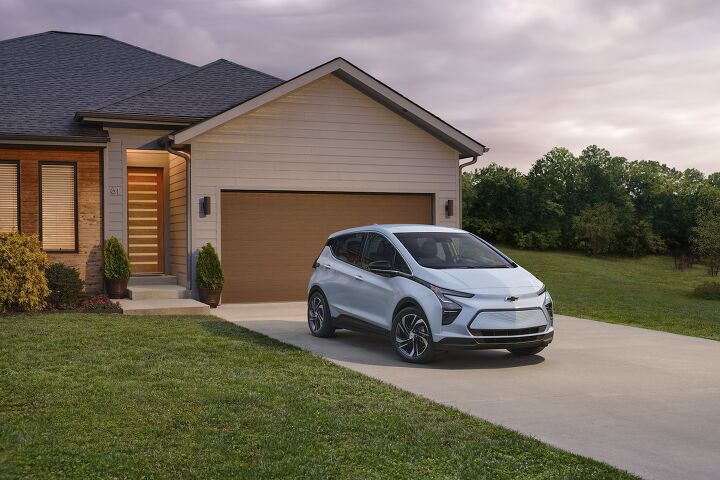

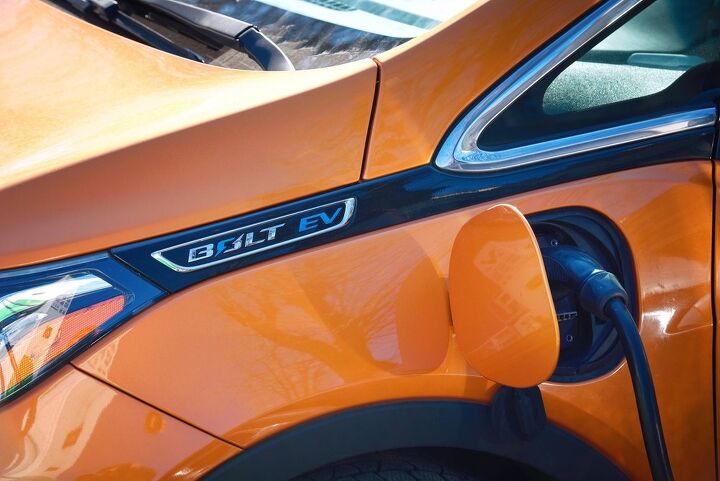
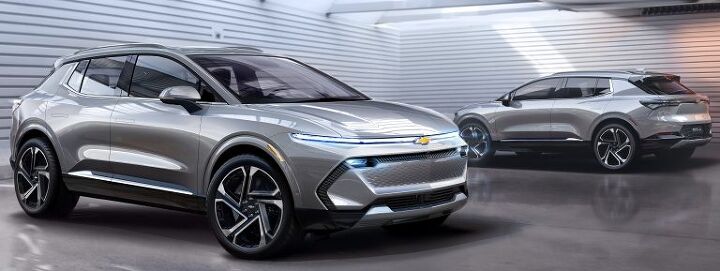

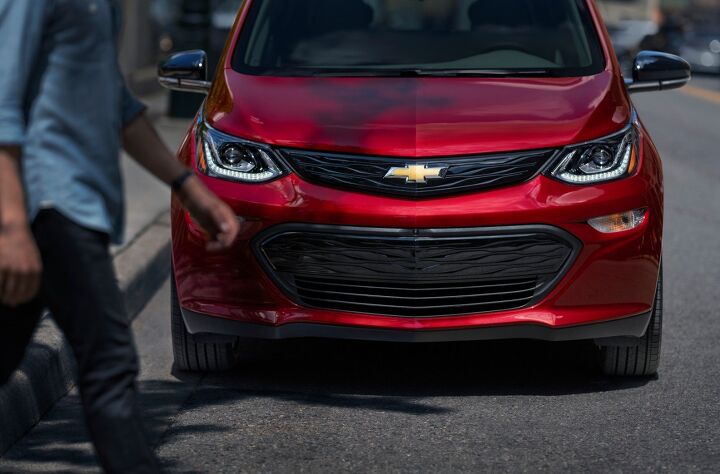

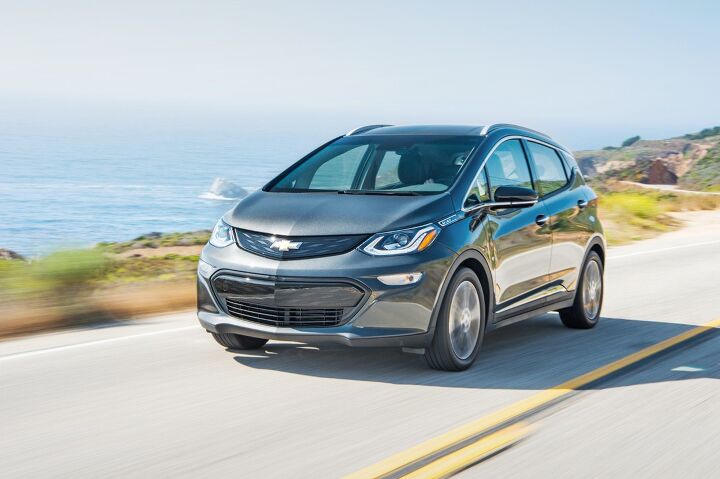
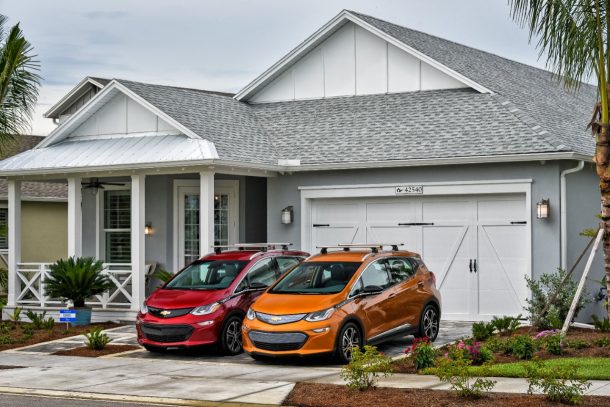
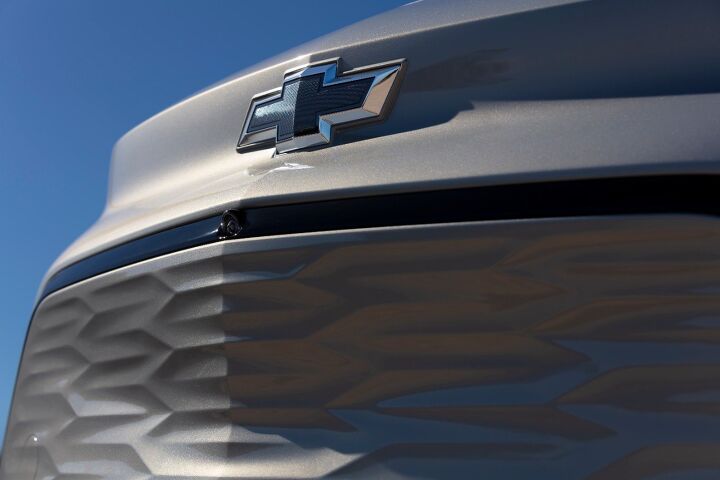

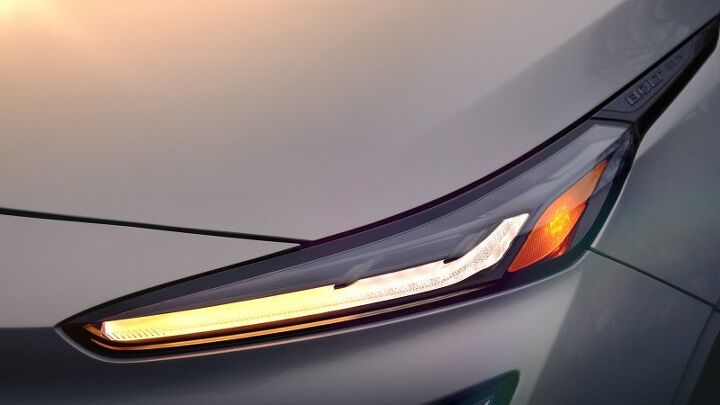












Recent Comments